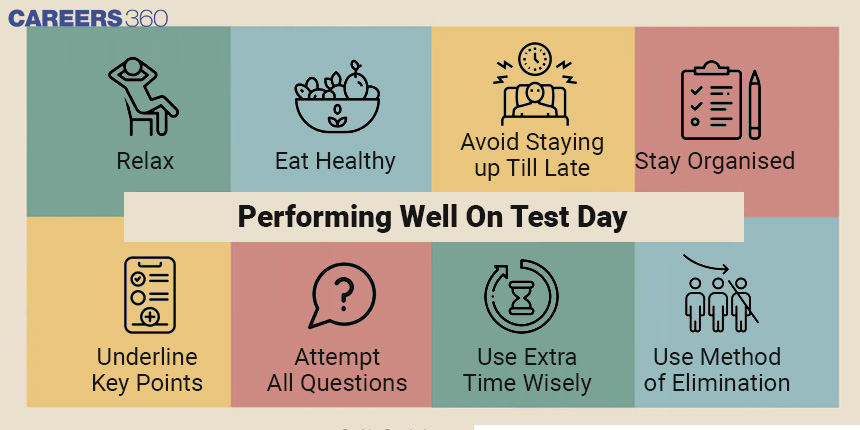10 Tips To Help You Perform Well On SAT/ACT Test Date
Standardised tests, that is, the SAT and ACT continue to be strong determinants of undergraduate admissions in prestigious universities abroad- specifically in the United States and Singapore. Even though many universities have adopted a more flexible ‘Test Optional’ (where submitting SAT/ACT scores is not a mandatory requirement but an option for undergraduate admissions approach), these tests continue to serve as an important marker of student competence and a strong determinant of admissions.

High school students, especially those from India, spend considerable resources in preparing for these tests, so much so that the standardised testing industry has emerged as one of the biggest sub-sectors within the education sector in India. After completing rigorous coursework for hours, students are often nervous about the test date. In fact, one’s headspace during the date of the test is one of the most important determinants of the ultimate test score. With this context, let us understand certain practices that can ensure optimal performance on the SAT/ACT test date, given a student’s preparation.
Performing Well On Test Day
Students appearing for the SAT/ACT exam should keep the following tips in mind when they sit to attempt the paper on the test day.
Relax
It is natural and obvious to feel anxious prior to and on the date of the standardised test. Whilst in the long run, this ‘stress’ can improve performance and drive hard work, anxiety is more of an enemy and less of a friend on the date of the test. Students and families should make active effort to ensure that they are relaxed on the test date. This can be achieved by meditation, listening to calming music, and reading. It is also important to stay away from others who are anxious during or before the test day. This could be other students or even members of one’s family. Anxiety and stress have a tendency of compounding and hence it is best to steer free of these before the important day. Keeping calm and having a hold over one’s nerves is important in driving optimal performance in the SAT/ACT.
Eat Healthy
There is not much difference between a high-intensity sporting event and a standardised test – both require intense preparation and optimal mental and physical conditions for high performance. Similar to how athletes are recommended to ensure a healthy diet especially prior to critical sporting events, students should keep away from junk food and develop an affinity towards healthy ones before test dates. Specifically, it is essential to drink lots of water and eat food that is rich in consumable calories.
Avoid Staying Up Till Late
The difference a good night’s sleep makes in the overall outcomes of a test is often understated. Being well-rested is critical in ensuring that your mind and body are prepared to undertake a challenge as rigorous as a standardised test. It is the instinct of many students to try and cramp up some last few hours of preparation before the test date. However, this strategy often proves to be counterproductive. Students should stay away from TV and computer screens, and should avoid staying up late before the day of the exam.
Also Read | Studying In The USA: Degrees, Funding, Opportunities, And More
Stay Organised
Organising the little things – be it one’s bag or travel plan helps in calming the mind, which is important in performing well. Moreover, being organised helps students ensure that they have all material (writing material, calculators, identity cards) that is required during the examination and that they are not missing out on anything important throughout the entire process.
Underline Key Parts
Ensuring optimal performance during standardised tests requires the brain to focus only on the most critical elements of a Maths or English problem. These keywords or numbers often hold the key to the entire solution, and spending more time on these and less on the other parts of the question simply leads to more efficient utilisation of resources. This also ensures that you arrive at the correct answer as quickly as possible with the highest level of confidence.
Come Back To Tough Questions
It is not wise to spend large amounts of time on a question that is difficult and tricky without completing the rest of the paper. This often leaves students with less time for the other and perhaps more important scoring parts of a question paper. If a question seems to be too difficult or unsolvable, it must be kept on hold till all other questions are completed. Only then should students spend long periods of time solving the most difficult questions.
Attempt All Questions
Unlike certain domestic standardised tests popular in India, the SAT and the ACT do not have a system of negative marking. Hence, students must seek to attempt all questions possible. Even if one is less confident about a question as compared to the others, it is better to attempt than leave it, as even a blind guess can lead to a correct answer and an improvement in score.

Use The Method Of Elimination
In line with the doctrine of answering all questions, the process of elimination enables students to reach the most likely answer for each question. For questions for which you do not know the answer, it is best to eliminate all options are that definitely NOT the answer. With each option eliminated, the chance of reaching the correct answer increases. Hence, eliminating bogus options can help streamline thought and genuinely improve the quality of guesses that one makes – ultimately contributing to better performance.
Use Extra Time Wisely
It is common for students to have extra time left at the end of the examination, even after answering all required questions. Whilst this does seem daunting after completing a long and challenging test, students must double-check all their responses to ensure that there are no avoidable errors and that all answers are as perfect as they can be. Corrections and modifications made during extra time often lead to positive outcomes in make-or-break situations in the long run.
Bubble In Batches
The SAT and ACT are often more about skill in answering the tests as compared to the competencies being tested themselves. Students should develop the efficient skill of bubbling answers on the answer sheet in batches. If one bubbles at the end of each answer, significant time is wasted and it leads to more lapses in concentration. On the other hand, leaving the entirety of bubbling for the end of the test can lead to anxiety, stress, and missing out on the process altogether (due to inefficient time management). Students should hence bubble answers in batches of either five or 10 questions to ensure the desired outcomes.
Each student is a unique learner and individual and hence each practice mentioned above may not apply uniformly to students with differing backgrounds, competencies, and personalities. However, following these approaches generally tends to improve both test scores and subsequent admissions outcomes. It must be understood that these approaches are not a substitute but a supplement to rigorous preparation for these tests. Preparation remains primary and key, and these practices can lead to a tangible improvement in the impact that preparation has on the ultimate score achieved by a student.
Vijeeth Srinivas is a development consultant with over three years of extensive experience in the foreign education industry. With the Centre for Career Development and Essai Education he has helped hundreds of students secure positions in leading universities abroad. He is keen to make novel developments in education and skill development more accessible to students from diverse socioeconomic backgrounds.
Popular Courses and Specializations
Popular Degrees
Popular Branches
Questions related to SAT
On Question asked by student community
Brooklyn Review is often considered good SAT coaching centers in Hyderabad because it offers structured and comprehensive SAT preparation the digital SAT format.
Hi, please find the NMMS answer keys for various states through the article link below - https://school.careers360.com/articles/nmms-answer-key
Careers360 has curated a perfect tool for candidates who want to take the online mock test for BITSAT. Use this link to start using the BITSAT Free Mock Test tool. If you want to practice an online JEE Main mock test , then you can visit the link given herein.
A score of 75 out of 180 (combined MAT and SAT) in the NMMS 2025–26 examination may be enough to qualify, but it might not be sufficient to get the scholarship, since the final cutoff depends on your category and state.
Click on NMMS Result 2025-26 (State-wise) to check more
Hi,
NMMS Tamil Nadu 2026 MAT and SAT answer keys have been released by the Directorate of Government Examinations Tamil Nadu (DGE TN). Students can download the official answer key PDFs from the DGE website. Each correct answer carries 1 mark, and there is no negative marking in the NMMS
Applications for Admissions are open.
Apply for UG & PG programs from Victoria University, Delhi NCR Campus
Study in Ireland
ApplyWant to study in Ireland? Explore Universities & Courses
Study in Canada
ApplyExplore Universities, Courses & Subjects | Work while study
Study in UK
ApplyApply for upcoming intake & plan your journey
Study in USA
ApplyUniversities inviting applications | Get expert guidance
Study in Australia
ApplyShortlist best ranked universities & get expert guidance
